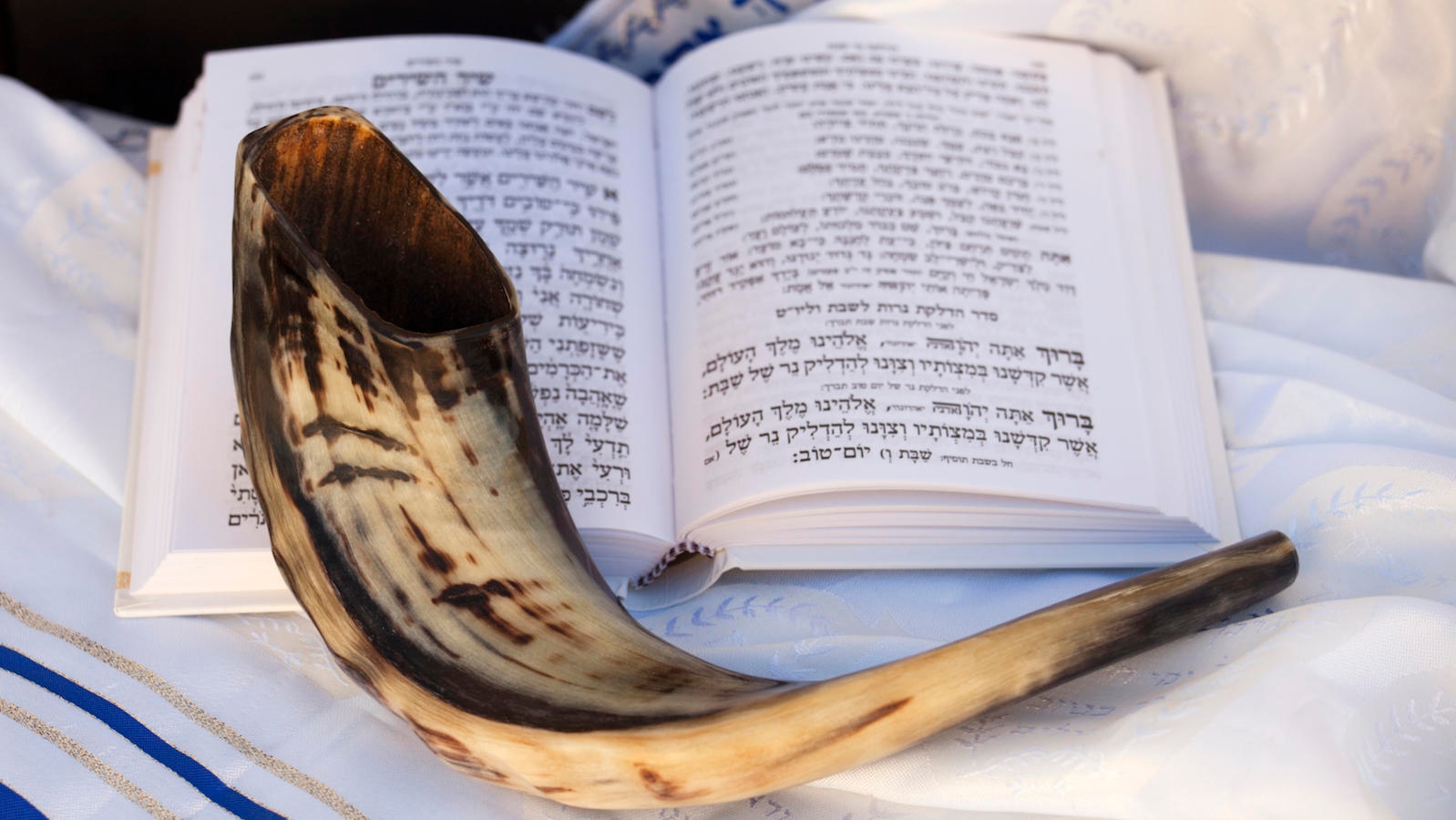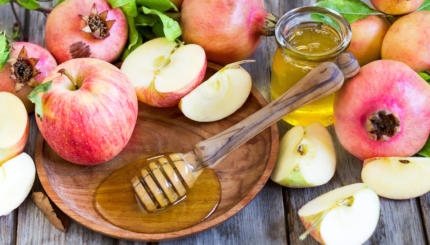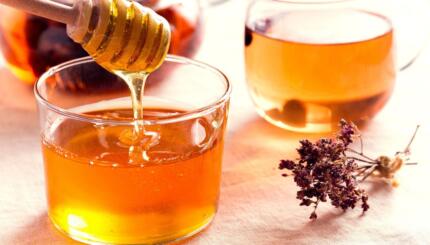What is Rosh Hashanah about exactly?
What traditional foods are served?
What do “shana tova” and “gmar hatima tova” mean?

Help us keep Jewish knowledge accessible to millions of people around the world.
Your donation to My Jewish Learning fuels endless journeys of Jewish discovery. With your help, My Jewish Learning can continue to provide nonstop opportunities for learning, connection and growth.
How long does Rosh Hashanah last?
Do I have to belong to a synagogue to go to Rosh Hashanah services?
Is it possible to live-stream Rosh Hashanah services from my computer?
Is it true that you are supposed to throw bread in the water on Rosh Hashanah?
What prayers do we read on Rosh Hashanah?
What sections of the Torah are read during Rosh Hashanah services?
What is Rosh Hashanah about exactly?
(the Jewish New Year) is simultaneously a time of great celebration and subtle trepidation. It is a day to celebrate our creation, but also a day of accounting and judgment for our actions. On Rosh Hashanah, we relate to God as the ultimate judge. The symbolic Book of Life is opened and we become advocates for our personal inscription in it. We review the choices we have made over the past year, our actions and our intentions, as we attempt to honestly evaluate ourselves. You may want to consult this list of questions to help in your introspection.
What is a shofar?
A shofar is a ram’s horn that is blown like a trumpet during the Jewish month of Elul that leads up to Rosh Hashanah, at Rosh Hashanah services and at the end of . The four sounds of the shofar – tekiah, shevarim, teruah and tekiah gedolah – remind many people of a crying voice. Hearing the shofar’s call is a reminder for us to look inward and repent for the sins of the past year.
What traditional foods are served? Are any foods forbidden? And what’s the reason for those round challah loaves?
Traditionally Jews eat sweet foods — like apples and honey, and tzimmes — to symbolize a sweet new year. (Here are some Rosh Hashanah recipes you may want to try.) Chicken and brisket are frequently served at Rosh Hashanah meals. In Sephardic tradition, a number of foods believed to signify our wishes for the coming year are eaten, such as pomegranates, leeks and pumpkins. All foods that can be eaten year-round are permitted. And the challah? It’s round as a reminder of the never-ending cycle of life.
What do shana tova and gmar hatima tova mean?
Shana tova means “Have a good year.” A similar expression is L’shana tova umetukah, which means “for a good and sweet year.” Gmar hatima tova literally means “a good signing/sealing.” This is a traditional greeting during the days from Rosh Hashanah through Yom Kippur, referring to the belief that on Rosh Hashanah our fates are written, or inscribed, in the Book of Life, and on Yom Kippur we are sealed in it.
How long does Rosh Hashanah last?
Traditionally Jews observe two days of Rosh Hashanah. In 2022, Rosh Hashanah begins at sundown on Sunday, Sept. 25 and ends at sundown on Tuesday, Sept. 27. However, many Reform congregations observe only the first day. But the holidays don’t end there: Yom Kippur falls 10 days later, followed by Sukkot and Simchat Torah.
Do I have to belong to a synagogue to go to Rosh Hashanah services?
No, although in most synagogues you will need to purchase High Holiday tickets in advance. If the cost is prohibitive, you can usually negotiate a lower rate. In addition, a number of congregations and other Jewish institutions offer free services, but you may need to do a little research to find them. Some suggestions to get you started are listed here.
Where can I find a live-stream of Rosh Hashanah services?
While traditional Jews do not use technology on Rosh Hashanah, a growing number of non-Orthodox congregations are broadcasting High Holiday services. Many also stream services and make previous services available for streaming anytime on their site or YouTube channel. Learn more about streaming High Holiday services here. You can also learn about how to get the most out attending a Zoom prayer service here.
Is it true that you are supposed to throw bread in the water on Rosh Hashanah?
Yes, during the Tashlich ceremony, usually held on the first day of Rosh Hashanah, Jews symbolically cast off their sins by throwing pieces of bread into a body of water.
What prayers do we read on Rosh Hashanah?
While some of the liturgy is similar to other weekday or Shabbat services, much of it is unique, and several of these prayers are repeated later on Yom Kippur. Arguably the most famous part of Rosh Hashanah services is the blowing of the shofar, and the most famous prayer is Unetanah Tokef, which inspired Leonard Cohen’s “Who By Fire.” A close second is “Avinu Malkeinu,” which means “our father, our king.”
What sections of the Torah are read during Rosh Hashanah services?
On the first day of Rosh Hashanah, most synagogues read Genesis 21:1-21:34, the section where Sarah and Abraham, after years of struggling with infertility, are blessed with a son, Isaac, after which Sarah banishes Hagar, the handmaid who is the mother of Ishmael. The second-day reading, Genesis 22:1-24, continues where the first day left off, with the story of the Akedah, Abraham’s near-sacrifice of Isaac. (In Reform congregations that observe only one day of Rosh Hashanah, only Genesis 22 is read.)
What is the prayer book for the High Holidays called, and are there any other special Hebrew terms I need to know during the holidays?
The prayer book for the holidays is called the Mahzor, and yes, there are numerous words and terms associated with Rosh Hashanah and Yom Kippur. You may find our Rosh Hashanah glossary and Yom Kippur glossary helpful.
Want to learn more about the High Holidays? Sign up for a special High Holiday prep email series.
Sephardic
Pronounced: seh-FAR-dik, Origin: Hebrew, describing Jews descending from the Jews of Spain.
Torah
Pronunced: TORE-uh, Origin: Hebrew, the Five Books of Moses.
Mahzor
Pronounced: MAKH-zore, Origin: Hebrew, literally “cycle” the mahzor is the special prayer book for the High Holidays, containing all the liturgy for Rosh Hashanah and Yom Kippur.



